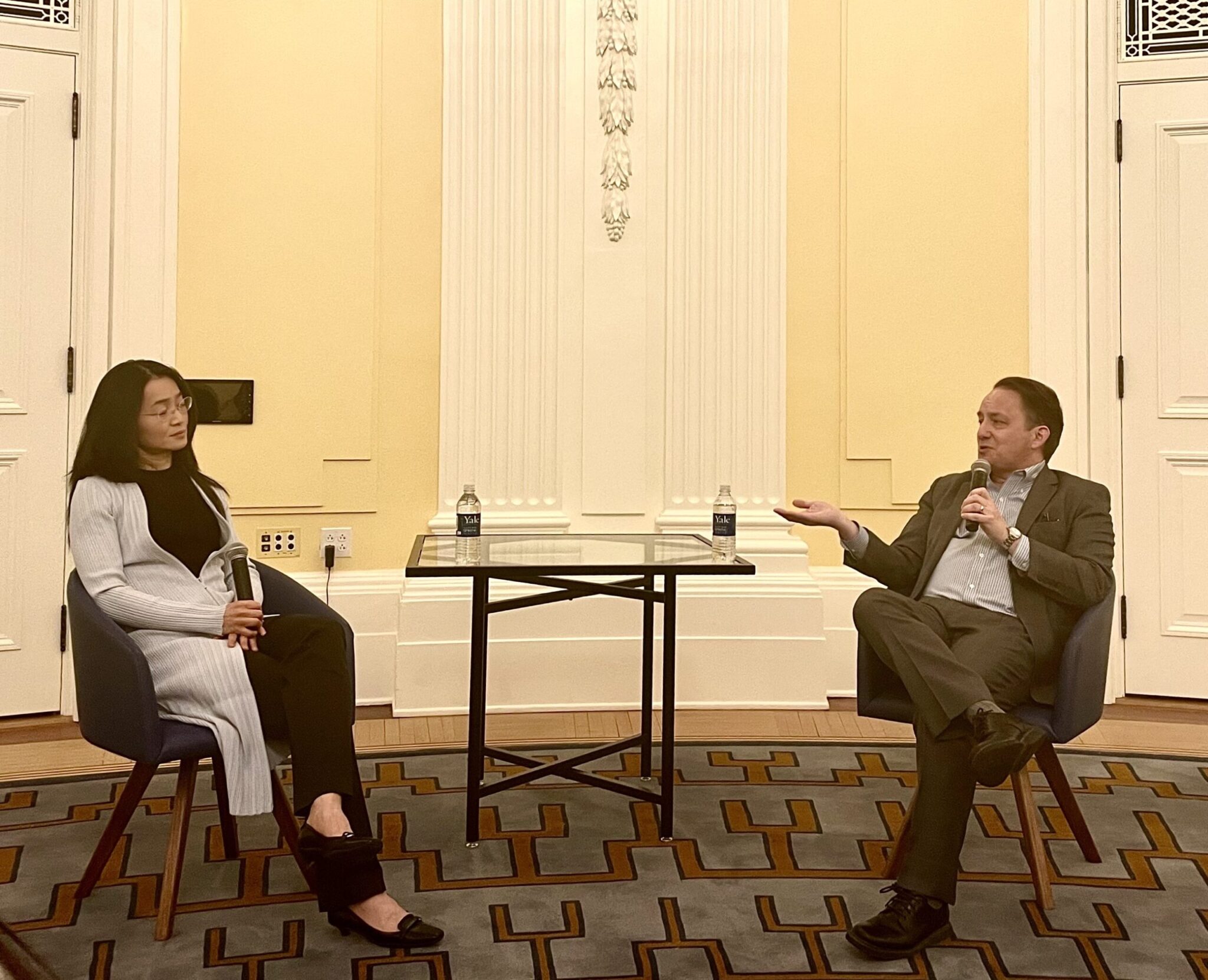Jing Tsu and Pericles Lewis discuss humanism in a time of U.S.-China polarization
As part of the Dean’s Dialogue Series, Professor Jing Tsu discussed her recently published book and focused on language as a way of understanding modern China.

Esma Okutan, Contributing Photographer
An interdisciplinary and humanist approach is necessary to understanding China and its geopolitical relations in today’s world, explained professor of East Asian languages and literatures and comparative literature Jing Tsu at a Wednesday talk.
On Feb. 1, Tsu and Dean of Yale College Pericles Lewis led a conversation on the role of the humanist in a time of increasing tensions between the U.S. and China. The event took place in the President’s Room at Schwarzman Center as part of the Dean’s Dialogue Series, which invites Yale professors to speak with Lewis and student attendees on contemporary issues of importance. This event focused on understanding China from an interdisciplinary perspective.
“We don’t have the luxury or the excuse to only know China through a certain venue,” Tsu, who is also a member of the International Security Studies research hub at the Jackson School of Global Affairs, said at the talk. “As a humanist, we’re trying to make and draw correlations and find parallels between past and present… as a literary scholar in particular, we learn how these connections yield new, meaningful ways of looking at things in a fresh light.”
When describing this approach to understanding China, Tsu stated that China and the U.S. have never been more alike, and that today’s political tensions actually reflect a competition between similar nations rather than antitheses. She emphasized the value of understanding this common ground as a form of intercultural awareness and dialogue.
Tsu discussed how these modern similarities could be studied by examining China’s institutional and even linguistic components. As she also wrote in her most recent book, “Kingdom of Characters: The Language Revolution That Made China Modern,” Tsu mentioned the evolution of Chinese language and efforts to make it more accessible on the global stage.
“One of the dimensions of China becoming like the rest of the world, one that I really enjoyed in [Tsu’s] book, is that all of these visionaries tried to promote the machines and codes and systems for modernizing the Chinese language and making it more accessible,” Lewis said at the talk. “What does that dream about a more easily learned and written Chinese language have to do with China’s sense of itself in the modern period?”
Tsu explained that all languages tend towards simplification, and the fact that the Chinese writing system still exists points to a common commitment to preserving language as cultural heritage and identity.
Pragmatically, Tsu explained that the power and advantages of the Western alphabet had prompted China to rethink its own language. She characterized these linguistic efforts to both preserve culture and to also make it more accessible as a “story of adaptation.”
“As humanists, we need to care about what they care about, so we have to learn about China the way China has learned about the U.S.,” Tsu said when asked about a humanist approach to international cooperation. “Studying literature, you get a special window into that culture… and into that history. Having that kind of exchange and keeping those venues open is critical.”
Whether through linguistic and literary understanding or other forms of cultural awareness, Tsu highlighted scholarly exchange as vital in today’s U.S.-China relations.
She emphasized the importance of scholarly cooperation not only for relations between the U.S. and China but also globally, in the face of multi-polarization.
“Especially in the world today, when we take short-term, small pieces of information — like infographics on Instagram — and immediately decide if we support or don’t support a cause, this event is a great reminder that in today’s world we need to really understand the background, context, and history of something to make a decision,” said Kevin Zhu GRD ’25, a fourth year graduate student studying chemistry who attended the event.
The conversation was the first of the Dean’s Dialogue Series events this semester.







